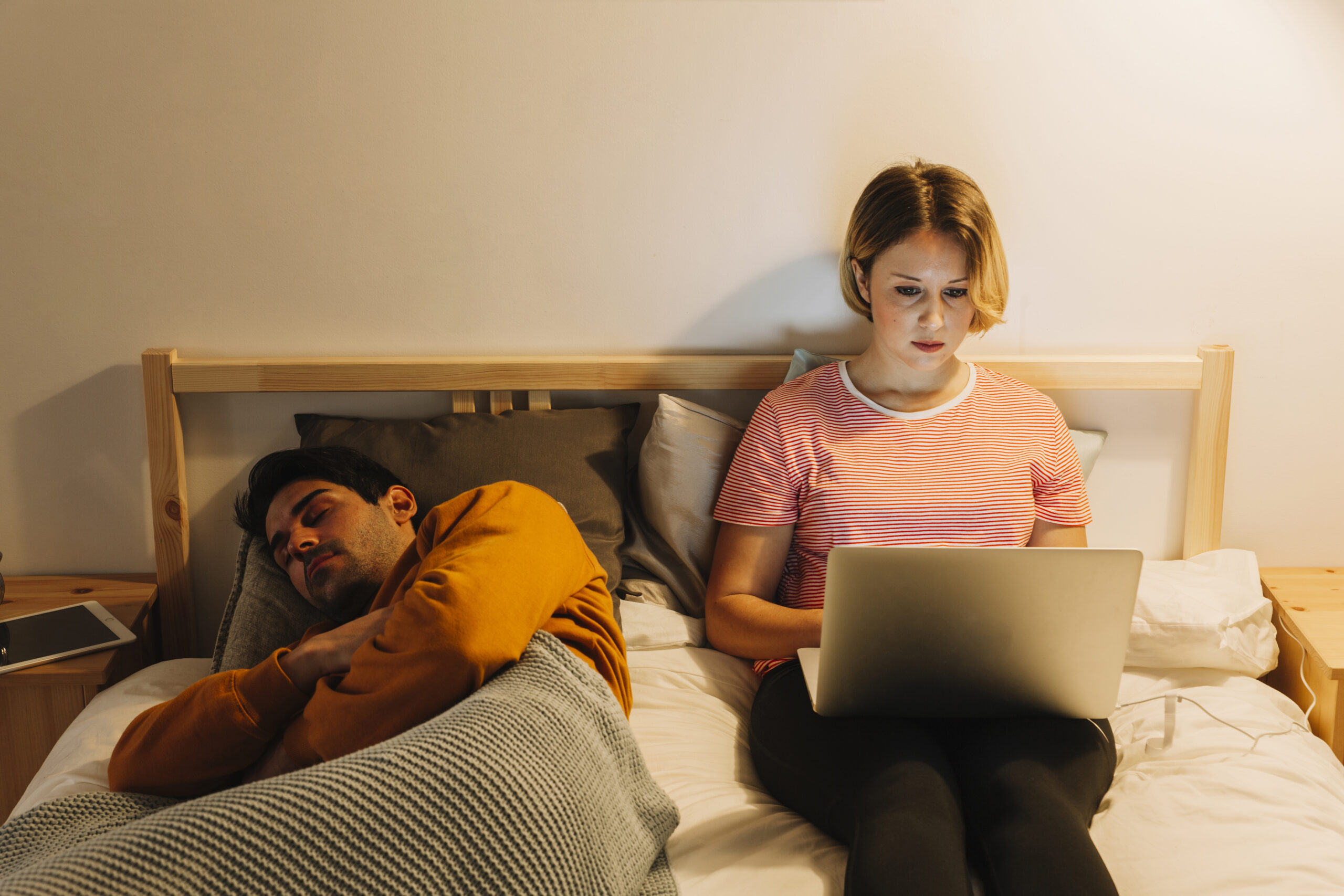In today’s digital age, screens have become an integral part of our daily lives. From smartphones and laptops to TVs and tablets, they dominate our work, leisure, and social interactions. But while these devices keep us connected, they also disrupt one of the most vital aspects of our health: sleep.
Research has shown that excessive screen use, particularly before bedtime, can significantly impact sleep quality, leaving us feeling tired, unfocused, and unproductive. In this blog, we’ll explore the science behind how screens affect sleep and provide actionable strategies to reclaim restful nights.
How Screens Impact Sleep: The Science
1. Blue Light Disrupts Melatonin Production
Screens emit blue light, a type of light that mimics daylight. While this is beneficial during the day for staying alert, exposure to blue light in the evening confuses the brain into thinking it’s still daytime.
- Melatonin Suppression: Blue light inhibits the production of melatonin, the hormone responsible for regulating sleep. Without adequate melatonin, falling asleep and staying asleep become difficult.
- Delayed Sleep Onset: Prolonged screen time pushes your body’s natural sleep cycle later, leading to fewer hours of restorative sleep.
2. Increased Alertness
Engaging with screens—whether it’s scrolling through social media, binge-watching shows, or replying to emails—keeps your brain active and alert. This heightened state of mental stimulation makes it harder to wind down and transition into a sleep-friendly state.
3. Eye Strain and Fatigue
Extended screen use can cause digital eye strain, leading to discomfort, headaches, and difficulty relaxing before bed. Symptoms like dry eyes or blurry vision can further disrupt your ability to fall asleep comfortably.
4. Overexposure to Content
Constantly consuming information, whether work-related or entertainment-focused, keeps your brain processing long after you’ve turned off your device. This mental overload can lead to racing thoughts and poor sleep.
The Consequences of Poor Sleep from Digital Disruption
Failing to address screen-induced sleep disruption can have far-reaching consequences:
- Decreased Productivity: Poor sleep affects memory, focus, and decision-making.
- Mood Disorders: Sleep deprivation is closely linked to increased stress, anxiety, and even depression.
- Physical Health Issues: Chronic sleep disruption raises the risk of conditions like obesity, diabetes, and heart disease.
Breaking Free: How to Reclaim Your Sleep from Screens
1. Establish a Screen-Free Zone
- Designate your bedroom as a no-screen zone to reinforce the association between this space and restful sleep.
- Replace devices with analog alternatives, such as books or journals, to unwind before bed.
2. Create a Digital Curfew
- Set a cut-off time for screen use, ideally 1-2 hours before bedtime.
- Use this time for relaxing activities like meditation, light stretching, or listening to calming music.
3. Adjust Your Device Settings
- Activate Night Mode: Many devices offer night mode settings that reduce blue light exposure by warming the screen’s color temperature.
- Dim Brightness: Lower your screen brightness to minimize eye strain in the evening.
- Use Blue Light Filters: Consider apps or built-in features that block blue light during evening hours.
4. Practice the 20-20-20 Rule
To reduce digital eye strain, follow this simple rule:
- Every 20 minutes, look at something 20 feet away for 20 seconds.
This helps relax your eye muscles and reduce strain.
5. Prioritize Relaxation Before Bed
- Replace screen time with activities that promote relaxation, such as reading a physical book, journaling, or practicing mindfulness.
- Incorporate calming routines, like a warm bath or aromatherapy, to signal your body it’s time to wind down.
6. Optimize Your Sleep Environment
- Keep It Dark: Use blackout curtains or an eye mask to block external light sources.
- Eliminate Device Glow: Turn off electronic devices or place them in another room to remove distracting glows or notifications.
- Create a Comfortable Setup: Invest in supportive bedding and pillows to enhance your sleep experience.
The Role of Technology in Supporting Sleep
While screens can disrupt sleep, certain technologies can help improve it:
- Smart Alarms: Gradually wake you up with soft light or sounds, mimicking natural sunrise patterns.
- Meditation Apps: Offer guided sleep meditations or soundscapes to calm your mind before bed.
- Sleep Trackers: Help you identify patterns in your sleep cycle and make informed adjustments.
Balancing Screen Use and Sleep Health
1. Be Mindful of Your Screen Time
Track how much time you spend on screens daily and set realistic goals to reduce usage, particularly in the evening.
2. Prioritize Daylight Exposure
Natural daylight exposure during the day helps regulate your circadian rhythm, making it easier to fall asleep at night.
3. Create Healthy Digital Boundaries
- Schedule device-free periods throughout your day to reduce overall screen dependency.
- Set expectations with colleagues or family members about your digital curfew to avoid late-night disruptions.
Sleep Well in a Digital World
Breaking free from the grip of screens is not about giving up technology altogether—it’s about creating healthier habits that support both your digital lifestyle and your sleep health.
By taking small, intentional steps to reduce evening screen time, you can improve your sleep quality, boost your productivity, and enhance your overall well-being. It’s time to reclaim your nights and wake up feeling rested, restored, and ready to face the day.
Rest better tonight by taking control of your screen habits—your mind and body will thank you.


Leave a Comment
Your email address will not be published. Required fields are marked *